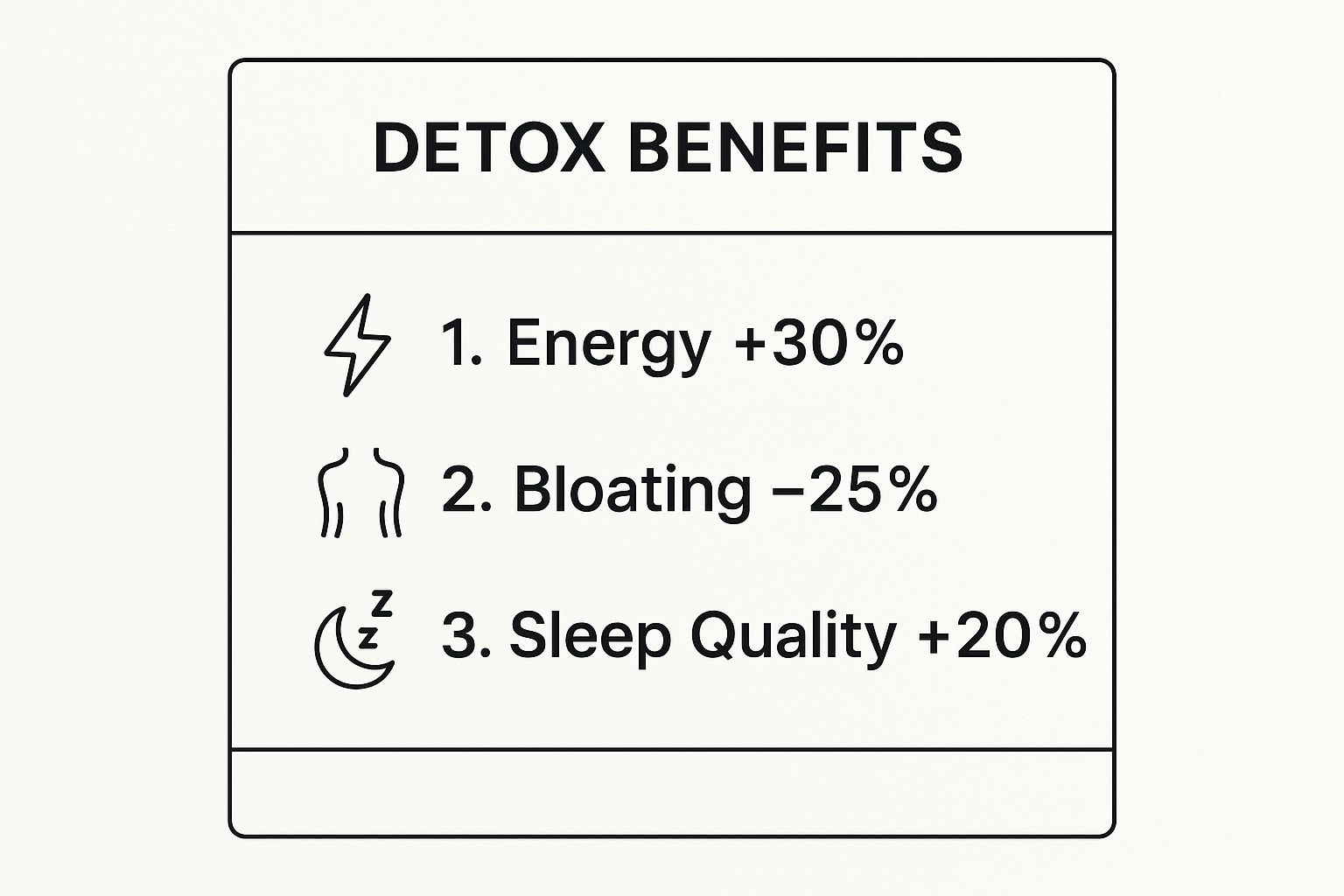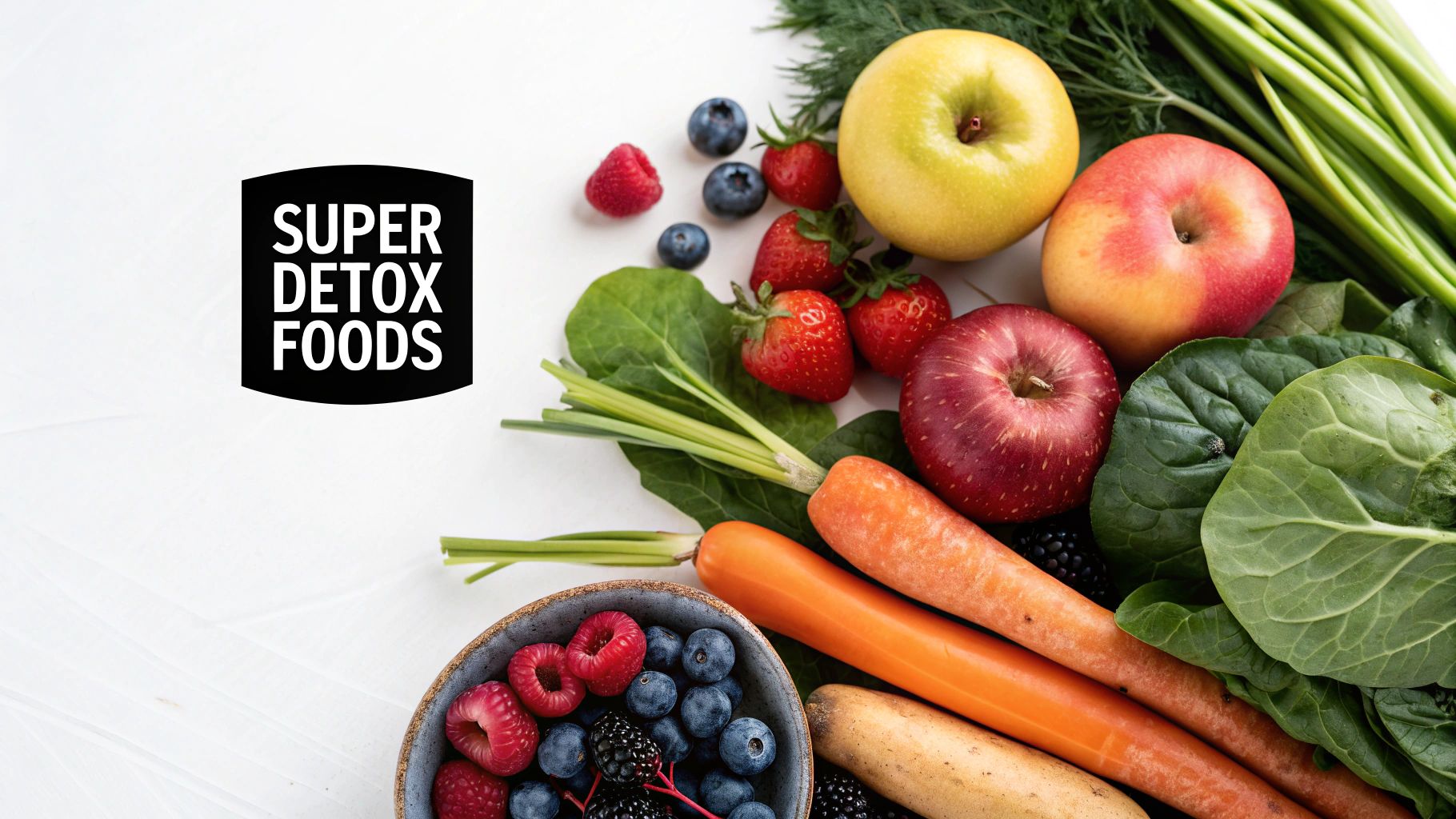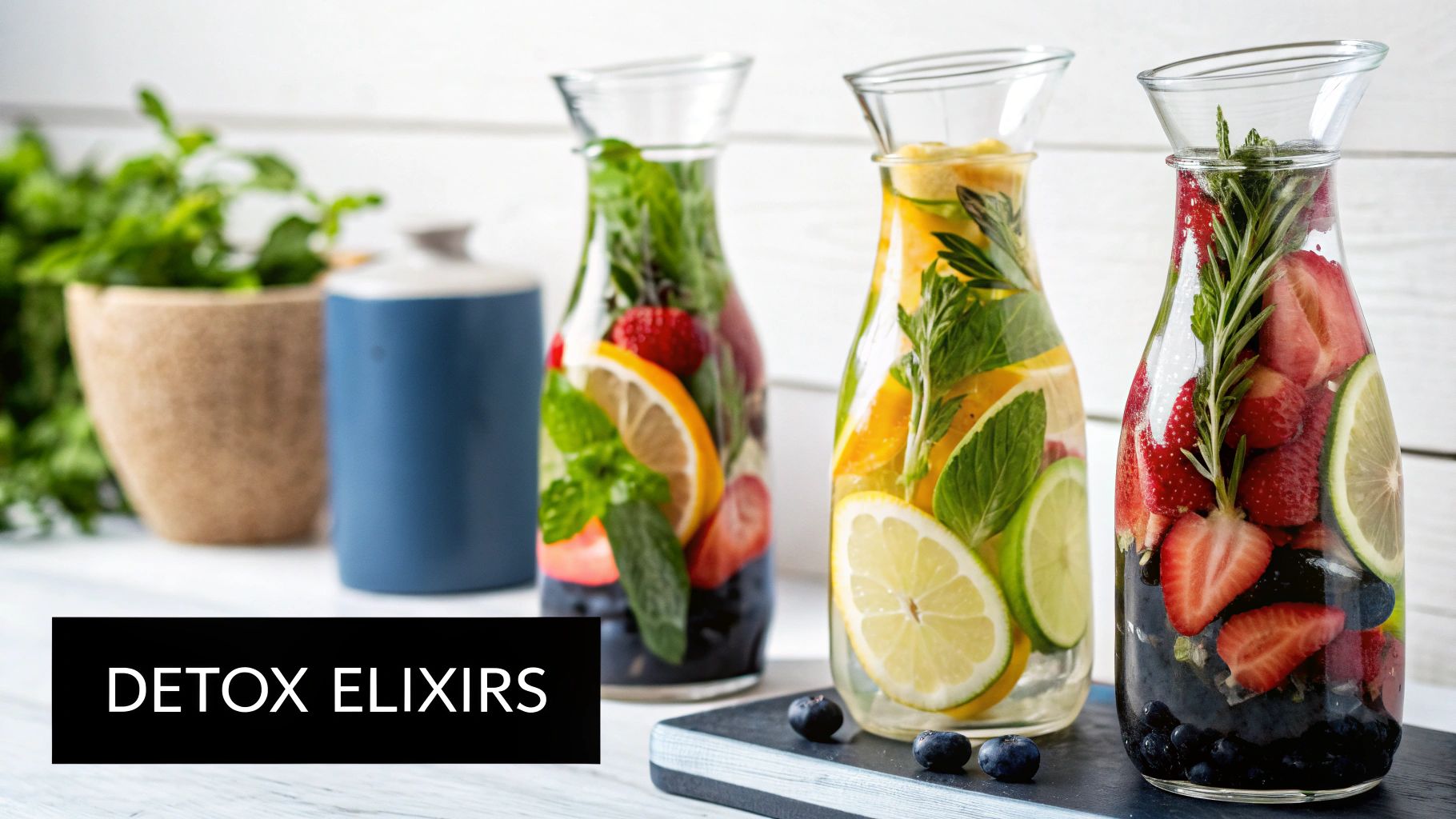
How to Detox Naturally and Feel Your Best
Share
When people talk about doing a "detox," they often picture extreme fasts or expensive supplement kits. But what if I told you that true, natural detoxification is much simpler and, frankly, more effective? It's not about a quick, punishing fix. It's about consistently supporting the incredible, built-in cleansing systems your body already has.
Think of your liver, kidneys, skin, and gut. These are your body’s powerhouse filters, working 24/7 to keep you healthy. A natural detox is simply about making smart, sustainable choices that help them do their jobs better. It's a shift from short-term fads to long-term wellness.
What Natural Detoxification Really Looks Like
Your body is a master of self-cleaning. As medical experts at platforms like Sutter Health will tell you, the human body is naturally equipped with highly efficient detoxification systems. These organs work tirelessly to process and eliminate unwanted substances, and they function best when we support them with a healthy lifestyle.
The real goal isn't a temporary fix. It's about creating a lifestyle that minimizes your exposure to harmful inputs while maximizing your body's amazing ability to manage them.
Moving Past Fads to Build a Solid Foundation
Forget the commercial "cleanses" that promise the world but often just lead to temporary water weight loss and a rebound. A real detox means focusing on the foundational habits that build lasting health day in and day out.
This is about what you do consistently: prioritizing whole, nutrient-dense foods, staying truly hydrated, getting deep, restorative sleep, and finding healthy ways to manage stress.

When you make these sustainable changes, the benefits are real. People often report a significant boost in energy (sometimes over 30%), a noticeable reduction in bloating (often around 25%), and a genuine improvement in sleep quality by as much as 20%. These aren't just numbers; they represent a tangible difference in how you feel every day.
Instead of a one-week challenge, think of this as an ongoing practice. Every wholesome meal, every glass of water, and every good night's sleep contributes to a cleaner, more resilient you. It’s a gentler, far more effective path to feeling your absolute best.
The table below breaks down the foundational habits that truly support your body's detox systems, contrasting them with some common fads and myths.
Core Pillars of Natural Detoxification
| Pillar | Focus | Common Misconception |
|---|---|---|
| Nourishment | Eating whole, organic foods rich in fiber and antioxidants to fuel your liver and gut. | You have to drink only juice for a week to "cleanse." |
| Hydration | Consistently drinking plenty of filtered water and herbal teas to support kidney function. | Any liquid, including sugary soda or coffee, counts toward hydration. |
| Lifestyle | Prioritizing 7-9 hours of quality sleep, daily movement, and active stress reduction. | A detox only involves changing what you eat or drink, not your daily habits. |
These pillars aren't about restriction; they're about providing your body with what it needs to thrive. By focusing on these core areas, you empower your natural detoxification pathways to work as intended.
Eating to Support Your Body's Natural Cleanse

When people talk about a “cleanse,” they often picture extreme fasts or complicated juice regimens. But in my experience, the single most powerful tool for supporting your body's natural detox is right there on your plate. Forget the harsh rules. A true dietary cleanse is all about strategically choosing whole foods that fuel your body's own incredible detoxification pathways.
We're talking about giving your liver, gut, and cells the exact nutrients they need to do their jobs effectively.
Let’s start with fiber—the unsung hero of your digestive system. Think of it as a natural scrub brush that sweeps waste through your intestines, preventing backups and keeping things moving. But it does more than just promote regularity. Fiber-rich foods are also the preferred meal for the beneficial bacteria in your gut.
When your gut microbiome is healthy and thriving, it’s better equipped to break down potential toxins and make sure they’re shown the door. Simple swaps like a morning bowl of oatmeal, a hearty lentil soup for lunch, or snacking on an apple can make a huge difference in your daily fiber intake.
Fuel Your Liver with Cruciferous Power
Your liver is the body's main detoxification powerhouse, and certain foods can give it a serious helping hand. I always recommend my clients load up on cruciferous vegetables like broccoli, kale, and cauliflower for this very reason.
These veggies are packed with compounds like sulforaphane, which actively helps the liver neutralize and process unwanted substances. It’s as easy as steaming a side of broccoli with dinner or tossing a handful of kale into your morning smoothie. These small additions help your liver perform its critical work more efficiently, lightening its overall load.
Neutralize Damage with Antioxidants
Every single day, our bodies face an onslaught of free radicals—unstable molecules that can cause damage at a cellular level. Antioxidants are your first line of defense. They work by neutralizing these free radicals before they can wreak havoc, a crucial part of any natural detox plan.
Where do you find them? In richly colored foods. Think deep-blue berries, dark leafy greens like spinach, and vibrant red beets. They’re absolutely loaded with these protective compounds.
A diet rich in a variety of colorful fruits and vegetables is your best strategy for getting a wide spectrum of antioxidants. Think of it as building a comprehensive shield for your cells.
By making a conscious choice to "eat the rainbow" every day, you're protecting your body from the inside out. For a truly effective cleanse, digestive health is paramount. You might also find it helpful to learn about the best herbs for digestive problems to give your gut some extra support.
Making It Practical and Sustainable
Knowing what to eat is one thing, but actually fitting it into a busy schedule is where the real challenge lies. A little bit of planning makes all the difference.
Here are a few tips I've seen work time and time again:
- Prep on Sunday: Take an hour over the weekend to chop veggies like onions, peppers, and broccoli. Storing them in glass containers in the fridge makes it incredibly easy to toss them into stir-fries or omelets during the week.
- Batch Cook Your Grains: Make a big pot of quinoa or brown rice. This gives you a ready-to-go base for healthy grain bowls, which you can then top with roasted veggies and a lean protein.
- Go Organic (When You Can): Choosing organic produce helps lower your exposure to synthetic pesticides. This reduces the burden on your liver, freeing it up to handle its other important jobs. If you're on a budget, focus on the "Dirty Dozen" list to get the most bang for your buck.
These small, practical habits are what turn healthy eating from a chore into a seamless part of your routine—and that’s the real secret to long-term success.
Hydration and Habits That Enhance Detoxification

While what you eat is the cornerstone of any good detox, your daily habits are what really supercharge the process. These small, consistent actions are the secret sauce, helping your organs run smoothly, keeping stress hormones in check, and making sure all that internal junk gets shown the door.
Let’s start with the absolute basics: water. It sounds simple, but every single one of your body’s functions—especially detoxification—hinges on being properly hydrated. Water is what keeps your blood moving, delivering nutrients where they need to go and, just as importantly, carrying waste away.
Your kidneys, in particular, are thirsty organs. Think of them as your body's most sophisticated filtration plant. They need a constant flow of water to effectively flush out metabolic byproducts and toxins through urine. When you're dehydrated, that entire system slows to a crawl.
Making Your Water Work Harder
If you find plain water a bit boring, there are simple ways to make it more supportive. A squeeze of fresh lemon is a great start. It doesn't just add flavor; it gives you a little hit of vitamin C and enzymes that can aid digestion.
Another favorite strategy of mine is to weave liver-supportive herbal teas into my daily routine. They're a comforting way to hydrate while giving your detox pathways some extra love.
- Dandelion Root Tea: A classic for a reason. This earthy tea is known to stimulate bile production, which is crucial for helping the liver break down fats and move toxins out.
- Milk Thistle Tea: The hero ingredient here is silymarin, a compound widely respected for its ability to protect and support liver cells from damage.
- Ginger Tea: Not just for upset stomachs! Ginger is a powerful anti-inflammatory that helps soothe the entire digestive tract and improve circulation.
Think of these daily habits not as chores, but as investments in your body's resilience. Consistent, small actions compound over time, creating a powerful buffer against the daily stressors your body encounters.
The Critical Role of Rest and Movement
Detoxification isn't just something that happens when you're awake and active. In fact, a lot of the heavy lifting happens while you're fast asleep. During deep, restorative sleep, your body switches into full-on repair mode. Your brain even has its own special waste-clearance system—the glymphatic system—that kicks into high gear, washing away metabolic debris that builds up throughout the day.
This is why aiming for 7-9 hours of quality sleep is non-negotiable. It’s one of the most powerful things you can do for your health. A good night's rest helps regulate hormones, dials down inflammation, and gives your liver the downtime it desperately needs.
Of course, movement is just as vital as rest. Getting your heart rate up with regular exercise boosts your circulation, which naturally speeds up the entire detoxification process. It also gets your lymphatic system—the body's internal drainage network—pumping, helping to clear waste from your tissues.
And let's not forget about sweat! When you work up a good sweat, whether from a brisk walk, a yoga class, or a session in a sauna, you're doing more than just cooling off. Your skin is one of your largest organs of elimination, and it releases small amounts of waste, providing another exit route for toxins.
Finally, managing stress is the glue that holds it all together. When you’re chronically stressed, your body is flooded with cortisol, a hormone that can throw a wrench in your liver function and digestion. Even just five minutes of daily meditation, some deep breathing exercises, or a short walk in nature can dramatically lower cortisol levels, creating an internal environment where your detox systems can finally do their job properly.
Creating a Cleaner Environment at Home

A genuine detox goes beyond just what you eat and drink. It's about what surrounds you every day. Your home should be your safe haven, but it's often filled with hidden chemicals that add to your body's toxic burden, making your detox organs work that much harder.
Taking charge of your home environment is a game-changer. It's a foundational step that many wellness experts, including myself, swear by. In fact, one survey of naturopathic doctors revealed that over 75% focus on detox methods to tackle environmental exposures right from the start.
The idea here is simple: lighten your body's load by cutting down on the synthetic stuff it has to filter out. You don't need a massive, expensive overhaul. A few smart swaps can make a huge impact.
Rethink Your Cleaning Caddy
Some of the most common sources of indoor pollution are sitting right under your sink. Conventional cleaning products are packed with harsh chemicals that can pollute the air you breathe and leave a residue on every surface they touch.
Switching to non-toxic cleaners is probably one of the most effective and simplest changes you can make. And the best part? You probably already have the key ingredients on hand.
- White Vinegar: The acidity is a powerhouse against grease and grime. I mix it 50/50 with water in a glass spray bottle for an incredible all-purpose cleaner.
- Baking Soda: A fantastic gentle abrasive and a miracle worker for deodorizing. It's my go-to for scrubbing sinks, tubs, and even crusty ovens.
- Lemon Juice: It naturally disinfects, helps lift stains, and leaves behind a genuinely fresh scent—not a chemical one.
Using these simple staples is not only safer but also cuts down on plastic waste, which is a big win for a zero-waste lifestyle. For example, using natural carpet cleaner recipes can drastically reduce chemical exposure in your main living areas, where your family and pets spend most of their time.
Scrutinize Your Personal Care Products
Remember, your skin is your body's largest organ, and it readily absorbs whatever you put on it. The lotions, soaps, and makeup you use every day can be loaded with endocrine disruptors—chemicals that can seriously mess with your body's hormonal balance.
Pro Tip: Become a label detective. If you see the word "fragrance," be skeptical. It's often a catch-all term that can legally hide hundreds of chemicals, including phthalates. Also, keep an eye out for parabens, a common preservative tied to hormone disruption.
Look for brands committed to simple, plant-based ingredients and full transparency. Opting for products packaged in glass or metal is another great way to minimize exposure to plastics like BPA.
Finally, think about your cookware. Those non-stick pans coated with PFOA can release harmful chemicals, especially at high heat. Swapping them out for safer alternatives like stainless steel, cast iron, or ceramic is a one-time investment that benefits your health with every single meal. Along the same lines, a good water filter is essential for removing chlorine, heavy metals, and other junk from your tap water, ensuring what you drink is truly clean.
Why Most Store-Bought Detoxes Don't Work
Let's be honest, the wellness aisle is overflowing with quick-fix promises. You've seen the brightly colored juice cleanses and the "teatoxes" that swear they'll help you drop pounds in just a few days. The idea of a fast reset is tempting, but it’s time we looked past the slick marketing to see why these commercial detox diets so often miss the mark.
The simple truth is that most of these fads are built on a shaky foundation. They treat your body like it needs a power-wash, a harsh, short-term scrub-down, when what it really needs is consistent, gentle support. The dramatic "results" they flash are usually just a mirage and almost never last.
The Myth of Fast Weight Loss
One of the biggest hooks for any commercial detox is the promise of shedding weight, fast. And sure, after a few days of nothing but juice or a special tea, the number on the scale might go down. But this isn't the win you think it is. What you're losing is mostly water weight, along with your body's stored carbohydrates (glycogen).
This isn't real, sustainable fat loss. Studies have consistently found very little evidence that these diets provide any lasting health benefits. Any weight that does come off is usually from water and carb stores, not fat, and it comes right back the second you start eating normally again. If you want to dig into the science, you can learn more about detox diet effectiveness from independent research. Once solid food is back on the menu, your body restocks its reserves, and the scale bounces right back up.
The Real Cost to Your Well-Being
It's not just that these trendy cleanses don't work long-term; many of them can actually be bad for you. When you drastically cut calories and eliminate entire food groups, you're setting yourself up for serious nutrient deficiencies. Your body gets starved of the protein it needs to maintain muscle, the healthy fats required for hormone balance, and the full range of vitamins and minerals that keep you running.
This can trigger a whole host of problems, including:
- Electrolyte Imbalances: Cutting out food can mess with the delicate balance of minerals like sodium and potassium, which are critical for heart health and nerve function.
- Muscle Loss: Without enough protein, your body might start breaking down muscle for energy. This is not what you want, as it slows down your metabolism.
- Gut Health Damage: Extreme diets can wreak havoc on your gut microbiome, harming the good bacteria that are essential for digestion and a strong immune system.
A true path to wellness isn't about suffering through a week of deprivation. It's about building a nourishing lifestyle that supports your body’s own brilliant detoxification systems every single day—without the crash-and-burn rebound.
In the end, these commercial fads often leave you feeling worse than when you started—tired, depleted, and with a potentially unhealthy relationship with food. The real, sustainable way to feel your best isn't found in a box or a bottle. It’s in the small, consistent choices you make to honor your body's natural intelligence.
Got Questions About Natural Detox? Let's Talk.
When you first decide to help your body detoxify naturally, a million questions can pop into your head. That's completely normal. You're making a change, and it's smart to want to know what's ahead. Let's walk through some of the things people wonder about most, so you can start this journey feeling prepared and confident.
How Long Does a Natural Detox Take?
This is probably the most common question I hear. The honest answer is that a true natural detox isn't a quick fix or a week-long challenge; it's a shift in how you live your life every day. The real goal is to weave these healthy habits—like eating whole, organic foods and drinking plenty of water—into your permanent routine.
That said, sometimes you just need a reset. If that's where you're at, a more focused detox for 2-4 weeks can work wonders. During this period, you’d be extra strict about cutting out things like processed foods, added sugars, and alcohol. It’s a fantastic way to recalibrate your system and really feel the difference.
The best mindset is to see this not as a temporary project, but as the new foundation for your long-term health. It’s all about building habits that last, not just checking a box on a challenge.
Is It Normal to Feel Worse Before You Feel Better?
I get this question a lot, and it's a valid concern. Yes, for some people, it's possible to feel a bit crummy at the start. If you're used to a diet heavy on processed foods, sugar, and caffeine, you might get temporary headaches, feel tired, or even a bit irritable for the first few days.
It's important to understand this isn't some mythical "toxin release" that fad diets talk about. It’s simply your body adjusting. You're taking away substances it might have become dependent on, like sugar or caffeine. Think of it like a short withdrawal period. Stick with it, because these feelings almost always disappear within a few days as your body finds its new, healthier balance.
What About My Morning Coffee?
Ah, the coffee question. For many, it's the toughest thing to consider giving up. Here’s the deal: you don't have to completely eliminate it to support your body's natural detox pathways. It really depends on you and how your body handles caffeine.
If a cup of coffee is a cherished part of your morning and doesn't give you jitters or stomach upset, you can make it work. Just try a few simple tweaks:
- Stick to one cup a day.
- Always opt for organic coffee to avoid pesticides.
- Skip the sugar and artificial creamers.
Now, if you're doing a more intensive, focused reset, you might really benefit from swapping that coffee for green tea. You'll still get a gentle energy lift from the lower caffeine content, plus a powerful dose of antioxidants without putting too much strain on your system.
Do I Really Need to Shell Out for Expensive Detox Supplements?
In a word: no. You absolutely do not need a bathroom cabinet overflowing with pricey pills and powders to detox your body naturally. The real heavy lifting is done by simple, powerful things: nutrient-rich whole foods, clean water, deep sleep, and moving your body. These are the cornerstones.
Sure, some supplements can offer extra support. Milk thistle is well-known for liver health, and a good probiotic can do wonders for your gut. But think of them as optional helpers, not the main players. Your primary focus should always be on your diet and lifestyle. If you're thinking about supplements, it's always best to chat with a healthcare provider who knows your personal health history first.
At Naked Pantry, we believe a cleaner lifestyle begins in the kitchen. We offer pantry staples that are completely free from plastic packaging, helping you cut down on daily exposure to chemicals like BPA and phthalates. It's a simple switch that supports your body's natural detoxification from the ground up. Ready to get started? Explore your options for a clean, zero-waste pantry at Naked Pantry.
